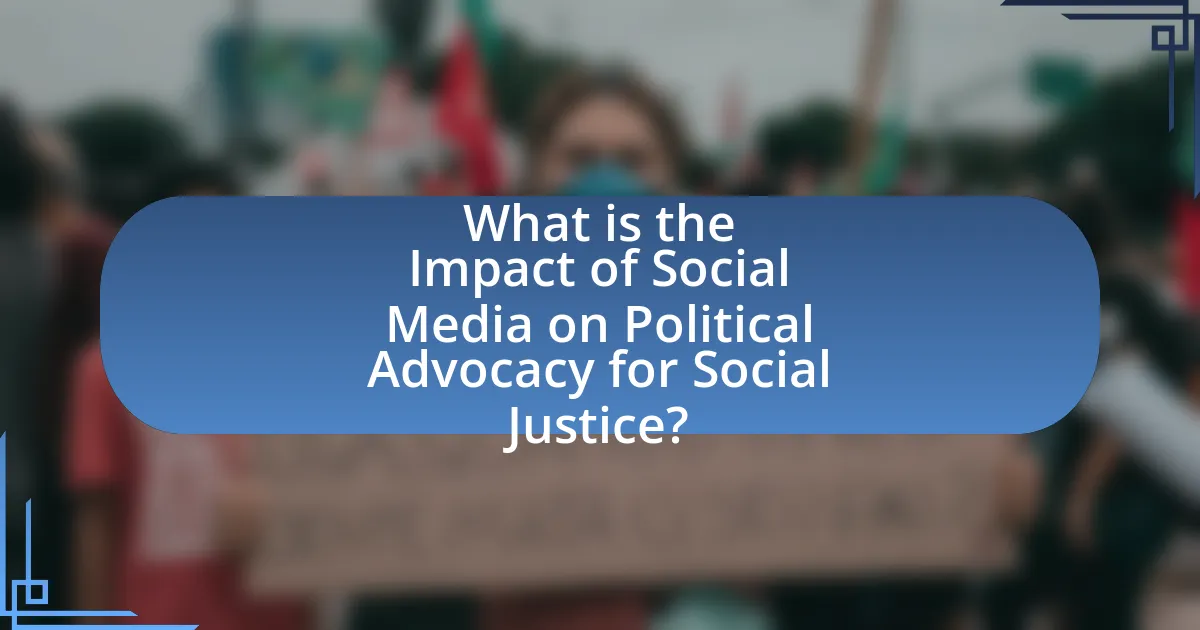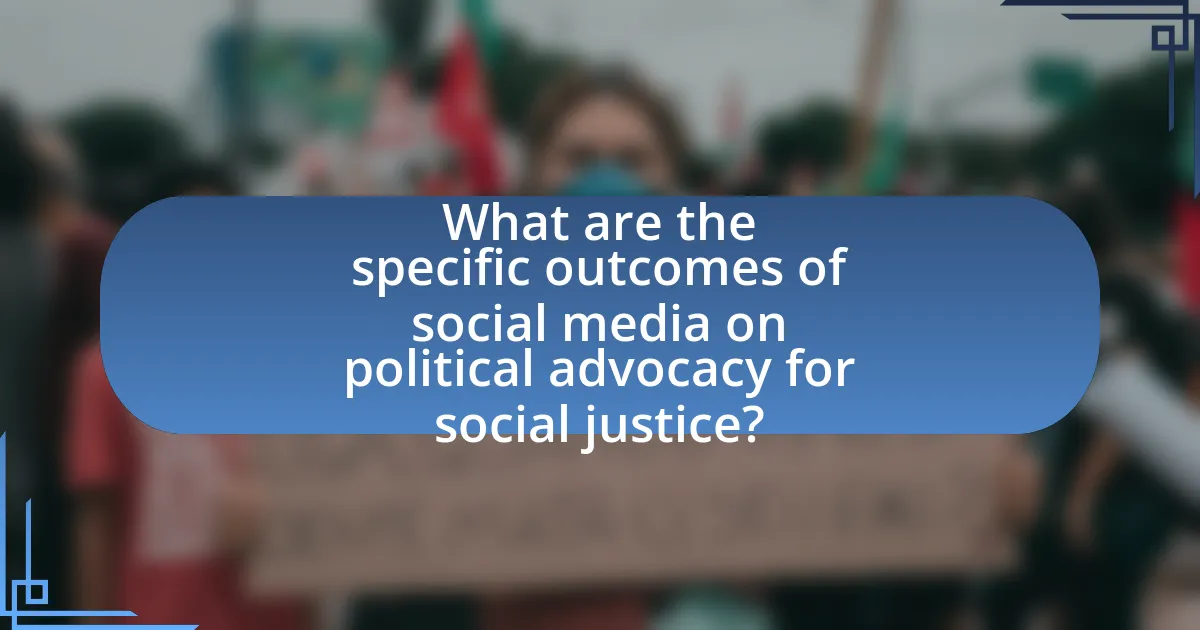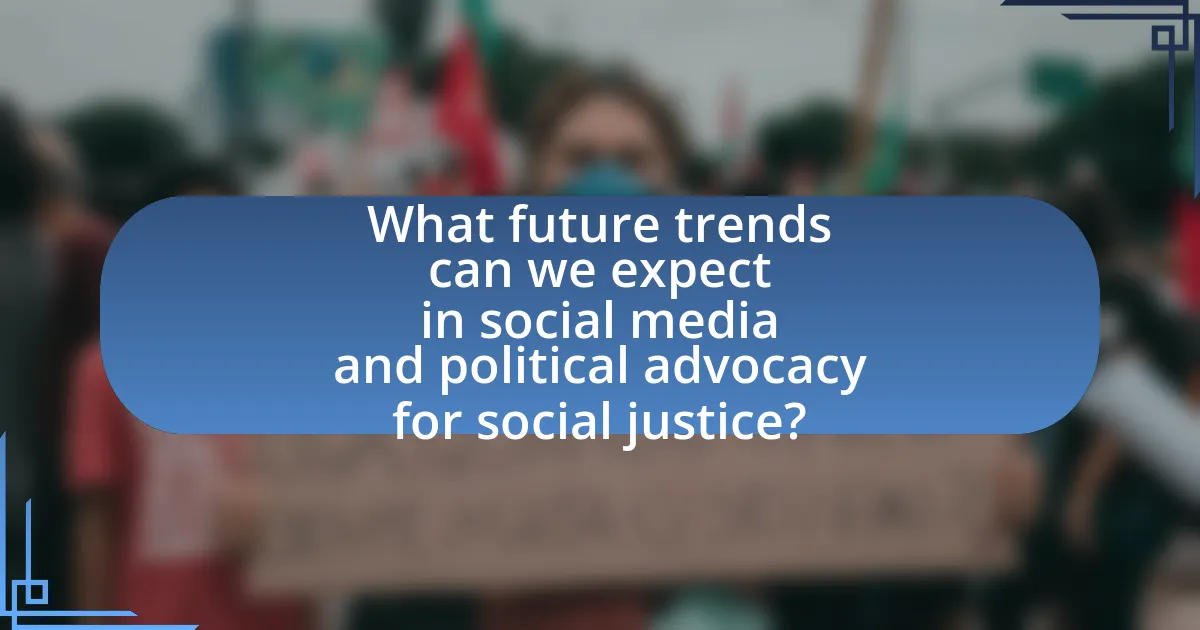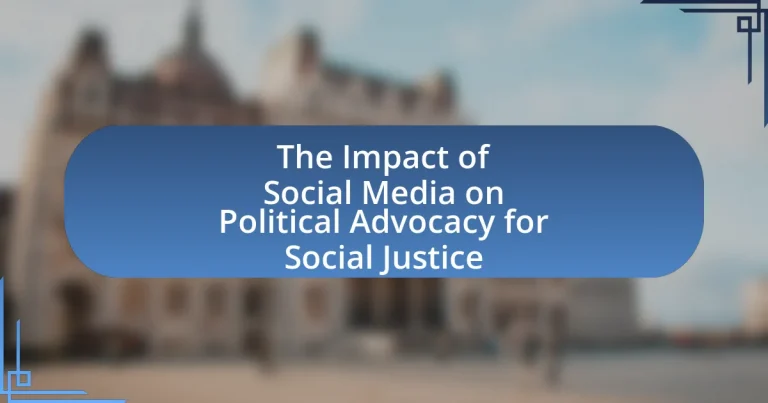The article examines the significant impact of social media on political advocacy for social justice, highlighting its role in amplifying marginalized voices and facilitating rapid information dissemination. It discusses how movements like Black Lives Matter have utilized social media platforms to mobilize support, raise awareness, and organize protests, leading to increased civic engagement. Key features of social media, such as widespread reach and real-time communication, are analyzed, along with the challenges advocates face, including misinformation and online harassment. The article also explores the effectiveness of different social media platforms in advocacy, the role of influencers, and future trends in social media technology that may shape social justice movements.

What is the Impact of Social Media on Political Advocacy for Social Justice?
Social media significantly enhances political advocacy for social justice by providing a platform for marginalized voices and facilitating rapid information dissemination. This impact is evident in movements like Black Lives Matter, which utilized platforms such as Twitter and Instagram to mobilize support, raise awareness, and organize protests, leading to widespread public engagement and policy discussions. Research indicates that social media campaigns can increase participation in social justice initiatives; for instance, a study published in the Journal of Communication found that social media use correlates with higher levels of civic engagement among young people. Thus, social media serves as a crucial tool in amplifying social justice advocacy efforts.
How has social media transformed political advocacy for social justice?
Social media has transformed political advocacy for social justice by providing a platform for rapid information dissemination and grassroots mobilization. This transformation is evident in movements like Black Lives Matter, which gained global attention through viral hashtags and online campaigns, leading to real-world protests and policy discussions. According to a 2020 Pew Research Center study, 69% of Americans believe social media is an effective tool for raising awareness about social issues, demonstrating its significant role in shaping public discourse and engagement.
What are the key features of social media that facilitate advocacy?
The key features of social media that facilitate advocacy include widespread reach, real-time communication, and user-generated content. Widespread reach allows advocates to connect with a global audience, amplifying their message and mobilizing support across diverse demographics. Real-time communication enables immediate responses to events, fostering timely engagement and action. User-generated content empowers individuals to share personal stories and experiences, creating a sense of community and solidarity among advocates. These features collectively enhance the effectiveness of advocacy efforts, as evidenced by movements like #BlackLivesMatter, which utilized social media to raise awareness and drive social change.
How do social media platforms differ in their impact on advocacy?
Social media platforms differ in their impact on advocacy primarily through their audience reach, engagement mechanisms, and content formats. For instance, Facebook’s extensive user base allows for broad dissemination of advocacy messages, while Twitter’s character limit fosters concise, rapid communication, making it effective for real-time updates and mobilization. Instagram, with its visual focus, enhances emotional engagement through imagery, which can be particularly powerful for social justice causes. Research indicates that platforms like TikTok engage younger audiences through creative video content, leading to viral advocacy campaigns that can quickly raise awareness. Each platform’s unique features shape how messages are crafted and received, influencing the overall effectiveness of advocacy efforts.
Why is social media important for social justice movements?
Social media is important for social justice movements because it facilitates rapid communication, mobilization, and awareness on a global scale. Platforms like Twitter and Facebook allow activists to share information, organize events, and amplify marginalized voices, significantly increasing the reach and impact of their messages. For instance, the #BlackLivesMatter movement gained international attention and support through social media, demonstrating its power to unite individuals across different regions and backgrounds in a common cause. Additionally, studies show that social media can enhance civic engagement; a Pew Research Center report indicates that 69% of adults in the U.S. use social media, making it a vital tool for reaching a large audience and fostering community solidarity around social justice issues.
What role does social media play in raising awareness about social justice issues?
Social media plays a crucial role in raising awareness about social justice issues by providing a platform for individuals and organizations to share information, mobilize support, and foster community engagement. This digital space allows for the rapid dissemination of information, enabling movements like Black Lives Matter and #MeToo to gain global traction and visibility. Research indicates that social media campaigns can significantly increase public awareness and engagement; for instance, a study published in the Journal of Communication found that social media use during the Arab Spring contributed to heightened awareness and participation in protests. Thus, social media serves as a vital tool for amplifying voices, educating the public, and driving social change.
How does social media empower marginalized voices in advocacy?
Social media empowers marginalized voices in advocacy by providing a platform for direct communication and community building. This accessibility allows individuals from underrepresented groups to share their experiences, mobilize support, and raise awareness about social justice issues. For instance, movements like #BlackLivesMatter and #MeToo gained significant traction through social media, enabling marginalized communities to amplify their messages and connect with a global audience. Research indicates that social media can increase engagement and participation in advocacy efforts, as seen in a study by the Pew Research Center, which found that 69% of adults in the U.S. use social media, making it a vital tool for outreach and activism.
What challenges do social justice advocates face on social media?
Social justice advocates face significant challenges on social media, including misinformation, harassment, and algorithmic bias. Misinformation can undermine their messages, as false narratives often spread more rapidly than factual content, making it difficult for advocates to maintain credibility. Harassment, particularly targeted at marginalized groups, can create a hostile environment that discourages participation and silences voices. Additionally, algorithmic bias can limit the visibility of social justice content, as platforms may prioritize sensational or divisive posts over those promoting equity and justice. These challenges hinder effective advocacy and can diminish the overall impact of social justice movements online.
How does misinformation affect social justice advocacy on social media?
Misinformation significantly undermines social justice advocacy on social media by spreading false narratives that can mislead public opinion and divert attention from critical issues. For instance, studies show that misinformation can lead to decreased trust in legitimate movements, as seen during the Black Lives Matter protests, where false claims about the movement’s goals circulated widely, causing confusion and backlash. Furthermore, a report by the Pew Research Center indicates that 64% of Americans believe misinformation has caused significant harm to public discourse, which directly impacts the effectiveness of advocacy efforts. This distortion of information can result in reduced engagement and support for social justice causes, ultimately hindering progress toward equity and justice.
What are the risks of online harassment for advocates using social media?
Online harassment poses significant risks for advocates using social media, including psychological harm, reputational damage, and potential physical threats. Advocates often face targeted attacks that can lead to anxiety, depression, and a sense of isolation, as evidenced by a study from the Pew Research Center, which found that 40% of social media users have experienced online harassment. Additionally, the reputational damage can undermine their credibility and effectiveness in advocacy efforts, as negative narratives can spread rapidly online. In extreme cases, online harassment can escalate to real-world threats, putting advocates’ safety at risk, as highlighted by incidents where activists have been doxxed or faced physical confrontations due to their online presence.
How can social media strategies enhance political advocacy for social justice?
Social media strategies can enhance political advocacy for social justice by amplifying voices, mobilizing supporters, and facilitating real-time communication. These platforms allow activists to reach a broader audience, as evidenced by the #BlackLivesMatter movement, which gained global traction through social media, leading to increased awareness and policy discussions around racial injustice. Furthermore, social media enables grassroots organizing, allowing individuals to coordinate protests and campaigns efficiently, as seen in the Arab Spring, where social media played a crucial role in mobilizing citizens for democratic change. The ability to share information quickly and widely fosters community engagement and solidarity, ultimately driving political action and influencing policymakers.
What are effective tactics for engaging audiences on social media?
Effective tactics for engaging audiences on social media include creating interactive content, utilizing storytelling, and leveraging user-generated content. Interactive content, such as polls and quizzes, encourages audience participation, leading to higher engagement rates. Storytelling humanizes messages and fosters emotional connections, which can increase shares and comments. User-generated content, such as testimonials or shared experiences, builds community and trust, as seen in campaigns like #BlackLivesMatter, which mobilized support through personal narratives and collective action. These tactics have been shown to enhance audience involvement and drive advocacy efforts in social justice movements.
How can advocates measure the impact of their social media campaigns?
Advocates can measure the impact of their social media campaigns through metrics such as engagement rates, reach, and conversion rates. Engagement rates, which include likes, shares, and comments, indicate how well the content resonates with the audience. Reach measures the number of unique users who see the content, providing insight into the campaign’s visibility. Conversion rates track specific actions taken by users, such as signing a petition or donating, reflecting the campaign’s effectiveness in driving desired outcomes. According to a study by the Pew Research Center, 69% of adults in the U.S. use social media, highlighting its potential for broad outreach and impact measurement.

What are the specific outcomes of social media on political advocacy for social justice?
Social media significantly enhances political advocacy for social justice by increasing awareness, mobilizing support, and facilitating grassroots organizing. The ability to rapidly disseminate information allows movements like Black Lives Matter to reach global audiences, evidenced by the hashtag #BlackLivesMatter generating over 30 million tweets in 2020 alone, which amplified calls for racial justice. Additionally, social media platforms enable real-time engagement, allowing activists to coordinate protests and campaigns effectively, as seen during the Women’s March in 2017, which drew millions worldwide through social media promotion. Furthermore, social media serves as a tool for accountability, enabling users to document and share instances of injustice, thereby pressuring institutions to respond. These outcomes illustrate the transformative role of social media in advancing social justice initiatives.
How has social media influenced public opinion on social justice issues?
Social media has significantly influenced public opinion on social justice issues by providing a platform for widespread dissemination of information and mobilization of activism. This influence is evident in the rapid spread of movements such as Black Lives Matter, which gained momentum through hashtags and viral posts, leading to increased awareness and public discourse around systemic racism and police brutality. Research by the Pew Research Center indicates that 69% of adults in the U.S. believe social media is an important tool for raising awareness about social justice issues, demonstrating its role in shaping perceptions and encouraging civic engagement.
What evidence exists to show changes in public perception due to social media campaigns?
Evidence shows that social media campaigns significantly alter public perception, particularly in social justice advocacy. For instance, the #BlackLivesMatter movement, which gained momentum through social media, led to a 20% increase in public awareness and support for racial justice issues, as reported by a Pew Research Center study in 2020. Additionally, a study published in the Journal of Communication found that social media campaigns can shift attitudes by creating emotional connections and fostering community engagement, resulting in increased activism and policy support. These findings underscore the effectiveness of social media in reshaping public perceptions on critical social issues.
How do social media movements translate into real-world action?
Social media movements translate into real-world action by mobilizing individuals, raising awareness, and facilitating organization around social justice issues. For instance, the Black Lives Matter movement, which gained traction on platforms like Twitter and Instagram, led to widespread protests and policy discussions regarding police reform and racial equality. According to a study by the Pew Research Center, 53% of social media users reported that they had engaged in political activism as a result of content they encountered online. This demonstrates that social media not only informs but also inspires collective action, leading to tangible changes in legislation and public policy.
What role do influencers play in social media advocacy for social justice?
Influencers play a crucial role in social media advocacy for social justice by amplifying marginalized voices and raising awareness about social issues. They leverage their large followings to disseminate information, mobilize support, and encourage action on various social justice causes. For instance, during the Black Lives Matter movement, influencers used platforms like Instagram and Twitter to share educational resources, promote petitions, and organize protests, significantly increasing public engagement and visibility. Research indicates that social media campaigns led by influencers can lead to higher levels of participation and donations for social justice initiatives, demonstrating their effectiveness in driving social change.
How can influencers amplify social justice messages effectively?
Influencers can amplify social justice messages effectively by leveraging their platforms to raise awareness, engage their audience, and foster community action. They can create content that highlights social justice issues, share personal stories, and collaborate with organizations dedicated to these causes. For instance, a study by the Pew Research Center found that 69% of adults believe social media is an effective tool for raising awareness about social issues. By utilizing hashtags, participating in campaigns, and encouraging followers to take action, influencers can mobilize their audience and create a ripple effect that extends beyond their immediate reach.
What are the potential downsides of influencer involvement in advocacy?
Influencer involvement in advocacy can lead to several potential downsides, including the risk of misinformation, superficial engagement, and the commodification of social issues. Misinformation can arise when influencers lack expertise on the topics they promote, potentially spreading inaccurate information to their followers. Superficial engagement occurs when influencers participate in advocacy primarily for personal branding rather than genuine commitment, which can dilute the message and impact of the cause. Additionally, the commodification of social issues can happen when advocacy becomes a marketing tool, prioritizing profit over meaningful change, as seen in campaigns where brands leverage social justice movements for commercial gain. These factors can undermine the authenticity and effectiveness of advocacy efforts.
How do different demographics engage with social media for social justice advocacy?
Different demographics engage with social media for social justice advocacy in varied ways, influenced by factors such as age, race, and socioeconomic status. For instance, younger individuals, particularly those aged 18-29, utilize platforms like Instagram and TikTok to share creative content and mobilize support for causes, as evidenced by the 2020 Black Lives Matter protests, where social media played a crucial role in organizing and spreading awareness. In contrast, older demographics, such as those aged 50 and above, often prefer Facebook for sharing articles and participating in discussions, reflecting a tendency towards more traditional forms of engagement. Additionally, racial and ethnic minorities frequently leverage social media to amplify their voices and experiences, with studies indicating that 70% of Black Americans use social media to discuss social justice issues, highlighting its importance as a tool for advocacy within these communities.
What trends exist in social media usage among various age groups for advocacy?
Younger age groups, particularly those aged 18-29, exhibit the highest levels of social media usage for advocacy, utilizing platforms like Instagram and TikTok to engage in social justice movements. In contrast, older age groups, such as those aged 50 and above, tend to prefer Facebook for advocacy purposes, focusing on sharing articles and community events. Research from the Pew Research Center indicates that 71% of adults aged 18-29 use Instagram, while only 32% of those aged 50 and older do, highlighting a significant generational divide in platform preference for advocacy. Additionally, younger users are more likely to participate in viral campaigns and use hashtags to mobilize support, while older users often engage in discussions and share information within established networks.
How do cultural differences affect social media advocacy strategies?
Cultural differences significantly influence social media advocacy strategies by shaping communication styles, values, and audience engagement methods. For instance, collectivist cultures may prioritize community-oriented messaging and group mobilization, while individualistic cultures might focus on personal narratives and self-expression. Research indicates that campaigns tailored to cultural contexts, such as the “Ice Bucket Challenge,” which resonated differently across various demographics, can enhance engagement and effectiveness. Additionally, understanding local customs and social norms can lead to more authentic interactions, as seen in the varied responses to social justice movements like Black Lives Matter, which adapted its messaging to resonate with diverse cultural backgrounds.

What future trends can we expect in social media and political advocacy for social justice?
Future trends in social media and political advocacy for social justice will likely include increased use of artificial intelligence for targeted messaging and enhanced data analytics to measure campaign effectiveness. As social media platforms evolve, algorithms will enable advocates to reach specific demographics more efficiently, thereby amplifying their messages. For instance, a study by the Pew Research Center indicates that 69% of adults in the U.S. use social media, making it a vital tool for mobilizing support and raising awareness on social justice issues. Additionally, the rise of decentralized social media platforms may provide safer spaces for activists to organize without the risk of censorship, as evidenced by the growing popularity of platforms like Mastodon. These trends suggest a future where social media not only serves as a communication tool but also as a strategic asset for social justice advocacy.
How might emerging technologies impact social media advocacy?
Emerging technologies significantly enhance social media advocacy by improving communication, engagement, and data analysis capabilities. For instance, artificial intelligence algorithms can analyze vast amounts of social media data to identify trends and sentiments, allowing advocates to tailor their messages more effectively. Additionally, augmented reality and virtual reality can create immersive experiences that engage audiences on a deeper emotional level, increasing the likelihood of mobilization for social justice causes. According to a 2021 study by the Pew Research Center, 69% of adults in the U.S. believe that social media is an effective tool for raising awareness about social issues, highlighting the growing importance of these technologies in advocacy efforts.
What role will artificial intelligence play in shaping advocacy strategies?
Artificial intelligence will significantly enhance advocacy strategies by enabling data-driven decision-making and personalized outreach. AI tools can analyze vast amounts of social media data to identify trends, sentiments, and key influencers, allowing advocates to tailor their messages effectively. For instance, a study by the Pew Research Center found that organizations using AI-driven analytics can increase engagement rates by up to 30%, demonstrating the technology’s impact on advocacy effectiveness. Additionally, AI can automate communication processes, ensuring timely responses to public inquiries and fostering stronger community engagement.
How can virtual reality enhance the experience of social justice advocacy?
Virtual reality can enhance the experience of social justice advocacy by immersing individuals in simulated environments that depict social issues, fostering empathy and understanding. This technology allows users to experience scenarios from the perspectives of marginalized communities, which can lead to increased awareness and emotional engagement. For instance, studies have shown that virtual reality experiences, such as “The 360-degree video of the refugee experience,” significantly increase empathy levels among viewers, as they can visualize the struggles faced by others in a more impactful way. By creating these immersive experiences, virtual reality serves as a powerful tool for advocacy, enabling activists to convey their messages more effectively and mobilize support for social justice initiatives.
What best practices should advocates follow when using social media?
Advocates should prioritize authenticity, engagement, and strategic messaging when using social media. Authenticity builds trust with the audience, as studies show that 86% of consumers value transparency from brands and organizations. Engagement involves actively responding to followers and participating in conversations, which fosters community and encourages sharing of advocacy messages. Strategic messaging ensures that content is clear, concise, and aligned with the advocacy goals, as effective messaging can increase the likelihood of mobilizing supporters. Additionally, utilizing analytics tools to track engagement metrics can help advocates refine their strategies based on what resonates with their audience.
How can advocates create authentic and engaging content for their audience?
Advocates can create authentic and engaging content for their audience by focusing on storytelling that resonates with personal experiences and community issues. This approach fosters a genuine connection, as research indicates that narratives can significantly enhance emotional engagement and relatability, leading to increased audience involvement. For instance, a study by the Stanford Graduate School of Business found that stories are 22 times more memorable than facts alone, highlighting the effectiveness of narrative in advocacy. By incorporating real-life examples and testimonials, advocates can illustrate the impact of social justice issues, making their content not only informative but also compelling and relatable.
What strategies can be employed to build a supportive online community?
To build a supportive online community, strategies such as fostering open communication, establishing clear guidelines, and encouraging active participation are essential. Open communication allows members to express their thoughts and feelings, creating a safe space for dialogue. Establishing clear guidelines helps set expectations for behavior, promoting respect and inclusivity. Encouraging active participation through regular engagement activities, such as discussions, polls, and events, strengthens community bonds. Research indicates that communities with strong engagement and clear norms experience higher levels of member satisfaction and retention, as seen in studies on online forums and social media groups.
What are the key takeaways for effective social media advocacy in social justice?
Effective social media advocacy in social justice requires clear messaging, community engagement, and strategic use of platforms. Clear messaging ensures that the core issues are communicated succinctly, making it easier for audiences to understand and share the message. Community engagement fosters a sense of belonging and encourages collective action, as seen in movements like Black Lives Matter, which utilized social media to mobilize supporters and raise awareness. Strategic use of platforms, such as Twitter for real-time updates and Instagram for visual storytelling, enhances outreach and impact. Research indicates that campaigns leveraging multiple platforms can increase visibility and participation, as evidenced by the success of the #MeToo movement, which gained traction across various social media channels.


